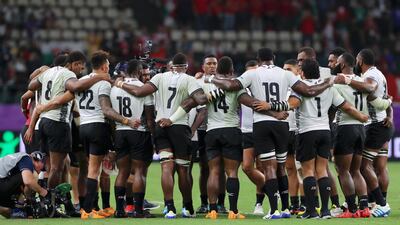It would be nice if this is the last ever Rugby World Cup in which we hear of teams being differentiated as Tier One and Tier Two.
Is it really going to change, though? Unlikely.
Tier 1 and Tier 2 are administrative terms that World Rugby themselves use. They are easy to use, and I guess there are no obvious replacement words. You don’t get it in football. A match would be between a higher-ranked team and a lower-ranked team.
It is something that has come into rugby’s vernacular, and I think it will be hanging around for a while when we talk about Fiji playing England, for example.
I think the game’s administrators need to do away with it, and do what they can to close that gap. Because, with the exception of Japan, it is going to be the same teams as always making up the quarter-final places at this World Cup.
The differences between the elite and the rest comes down to the way the international game is financed.
Put simply, if a team is travelling to play a Test match in England, for example, England pick up all the touring team’s costs. That is, their transport, travel and accommodation – but they keep all of their home gate receipts.
The caveat to that is the top nations will chat to each other about hosting each other a certain amount of times.
With that, they will ask amongst themselves for a fee. So the All Blacks, for example, might say: “Yes, we will come to Twickenham, but we want £2.5 million to play, because we are world champions and the best team in the game.”
But for Fiji and other teams, the host country don’t have to pay anything for them to come and play. And neither do they get any of the gate receipts.
Then if you flip the situation – and there are always calls for the major nations to go and play in Fiji – that is not exactly a solution, either.
If they did, it would cost Fiji a lot of money. They take on all the touring side’s costs, but they will never be able to get near making that back on ticket sales, because they cannot charge the same prices in the Pacific as in London.
It is just not fair. What about having a profit share? So that when a team like Fiji, Samoa or Tonga come to England or New Zealand or Australia, a small percentage – five per cent, or even a tiered percentage based on how big the stadium is – could go to that team.
If that happened, that would solve nearly all of the financial problems of all of those Tier 2 countries.
For their part, World Rugby get most of their own funding from a World Cup. That drives all their investment for the next four years.
Some of that money will be sent to develop Fiji, Samoa and Tonga, for example, and that is all they get. That is basically it when it comes to their income streams.
It will be a real worry for rugby for World Rugby given the various investment opportunities out there for the countries.
With companies like CVC looking to buy the Six Nations Championship, that will dilute the power of World Rugby more and more and more, until they will be struggling to have enough money to grow the game.
Ultimately, World Rugby can help with funding and bringing people in – but those nations also need to drive things from within.
We have seen something similar in Canada and United States. Governance structures have let them down. The USA is very fragmented. And Canada haven’t really improved since 1987, even though they have a very traditional base for rugby in their schools and their clubs.
Where I think it works well is when World Rugby makes an investment in a coach, and they are embedded in those countries for a good period of time.
Not like a lot of countries are doing – Canada, USA, Russia, Samoa, Tonga – where the coaches come in, but they don’t stay in the country for long, they just give a boost for a short time frame.
If those coaches, who are all really good, spent a lot longer in those countries, we would see proper change.
Now there is a sticking-plaster mentality. World Rugby look like they are helping because they are putting some big name coaches who are putting their experience into these countries. But they are there for such a short time, that actually it is a false economy.
World Rugby should be saying, “Look, we will take you to these countries, make you head coach – but you are there for two years-plus. We need you to make a proper change.”
Ben Ryan coached Fiji to Olympic gold in Rio in 2016, and won the Dubai Rugby Sevens four times - twice with England, and twice with Fiji


